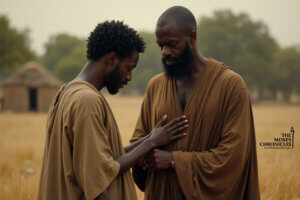
In many Kenyan homes, there is a silence—between father and son, mother and daughter, brother and brother. Sometimes it is the silence of distance. Sometimes betrayal. But what if even betrayal could become the soil where healing grows?
Faith After Betrayal: What Joseph’s Story Teaches About Family Healing in Kenya
When Joseph’s brothers threw him into a pit, they didn’t just break his body—they fractured a family. His story begins in betrayal, but it doesn’t end there. For Kenyan readers, this journey is more than a biblical account. It’s a mirror. One that reflects the quiet heartbreak found in many homes, and the hope that even broken things can be restored.
When Betrayal Begins at Home
In The Moses Chronicles: Prelude, Joseph’s betrayal doesn’t come from enemies—it comes from his own blood. The story doesn’t flinch from that pain. Reuben’s regret, Judah’s silence, Simeon’s fury—it all plays out in slow, sacred tension. Many Kenyan families know this wound. Whether through property disputes, abandoned promises, or the heavy silence of unresolved pain, betrayal often begins with those closest to us.
“They bowed before him—but not because he demanded it. Because they were finally ready to face their sin.”
Forgiveness Without Denial
Joseph doesn’t pretend nothing happened. He weeps. He tests. And then—he forgives. Not because they deserved it, but because he chose to be whole. In Kenya, where many are taught to “let things go” without true healing, Joseph’s approach offers something deeper: reconciliation that requires honesty.
He names the pain. Then he names the future. He feeds the very people who once left him to die. Forgiveness isn’t weakness—it’s a weapon of the healed.
Healing Is a Communal Act
This isn’t a solo redemption story. Joseph includes his brothers in the vision. He doesn’t exile them—he creates a place for them to thrive. In Kenyan homes, we often carry forward unresolved legacies. Joseph’s healing reminds us: the work isn’t done until the whole household is safe again.
The Women Who Held the Line
We must speak of Dinah. Of Asenath. Of the women who did not get chapters in Sunday School but carried the emotional labor of an entire nation. It is Dinah who steps into silence and offers her brothers a chance to see Joseph through her eyes. It is Asenath who teaches the next generation what it means to be Hebrew and whole—even in Egypt.
In many Kenyan households, women are the glue, the memory keepers, the silent intercessors. This book doesn’t forget them. Neither should we.
“You are not a debt,” Joseph said. “You are the light left to us.”
What This Story Offers Kenya
Kenya is in transition. Economically. Spiritually. Generationally. And in the middle of it all are families trying to heal from things they never chose.
Joseph’s story tells us that healing isn’t a moment. It’s a decision we make again and again: to forgive without forgetting, to bless while still bearing scars, to build homes where grief once lived.
“Do not fear this blessing,” he said. “It is an honor, not a burden.” Joseph spoke to sons who bore the weight of their family’s past. In Kenya too, many carry burdens they never chose.
📖 Download 7 Free Chapters (No Sign-Up Needed)
We’re offering seven chapters—three from Prelude, four from Hands That Rock the Cradle—so you can begin the journey yourself.
✅ Discover how biblical fiction can speak into Kenyan homes and hearts
✅ Read how forgiveness restored a family long before deliverance came
✅ Walk through betrayal, blessing, and legacy with Joseph and Dinah
📩 Click here to download your free sample
Learn more about: Prelude or Hands that Rock the Cradle
International Readers: We’ve made paying in your local currency easy:
KENYA |
PHILIPPINES |
SOUTH AFRICA |
NIGERIA
About the Author
RR Wekesa is a Christian historical fiction author writing faith-rich novels that follow the ancient paths of Scripture, weaving sacred silence and poetic rhythm into every chapter of The Moses Chronicles.
